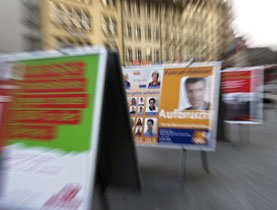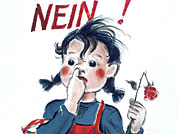Women encouraged to grow political wings

While women are highly visible in the elite of Swiss politics this year, filling more top posts than ever before, those starting out still struggle to catch up.
One women’s centre in Fribourg, western Switzerland, has decided to play its part ahead of next year’s federal elections by offering a course designed to help women turn their political aspirations into reality.
In the four decades since Swiss women won the right to vote they have made impressive inroads into politics. Today one in four elected representatives at federal and cantonal level is a woman.
However the women activists of Fribourg do not want to wait another 40 years to reach parity. “Women in Public Life” is the first course of its kind to be offered in the canton of Fribourg.
Béatrice Ackermann, president of Espace Femmes and active in local politics herself, is one of the initiators of the project. She sees internal and external barriers holding women back.
Overcoming obstacles
“There are lots of very able women who are interested [in the course], drawn by this idea, I’m amazed they have this desire and haven’t acted on it yet,” she told swissinfo.ch.
“It’s a pity when you want to take a more active part in society, to let yourself be held back by small obstacles – such as speaking into a microphone – that we can learn to overcome.”
Improving communication skills is an important element of the course, which has a strong practical approach.
Participants will have workshops on public speaking, writing and convincing one’s audience. They will have studio training, make contributions to radio and television debates and host the course’s own debating event.
With an introduction to the six main political parties and the political system, the course will also try to address the lack of knowledge about politics.
“Women find it hard to identify with a particular party and decide which party corresponds to the values they want to defend,” Ackermann said.
Confidence issues
Esther Egger-Wyss, a parliamentarian representing the centre-right Christian Democrats from the eastern canton of Aargau, also gives workshops introducing women to politics.
“I always say to women: you can do it and just as well as men. But I notice that women tend to lack confidence and fear they are not be able to argue effectively,” Egger-Wyss told swissinfo.ch.
“A large part of it is learning by doing. You don’t know until you try. I find that women often put in more preparation for a debate or meeting to make up for any insecurity they may feel, and as a result they come across very well.”
With more than 15 years of local and cantonal politics behind her, Egger-Wyss was elected to the House of Representatives in 2007.
She points out that the lack of adequate childcare structures to support the dual burden of family and professional life makes it harder for many women to find the time to enter politics.
Egger-Wyss believes there is a need for courses tailored for women, such as the one offered by Espace Femmes but she is against the principle of quotas.
Swiss voters overwhelmingly rejected a quota initiative in 2000. “I’m strongly against any kind of quota system for women in politics,” Egger-Wyss said.
“The change should come about through raising awareness so that women realise how important it is for their lives.”
Words into action
The final module of the Fribourg course is devoted to campaigning and aims to give the participants the impetus they need to begin campaigning, backed by a network of resources and contacts.
In the general election of 2007 some 35 per cent of candidates running for seats in the House of Representatives were women although they only made up 29.5 per cent of those elected.
Josiane Aubert of the Social Democrats was among the new members of parliament elected in 2007. She agrees that women still need some encouragement to take the plunge into politics.
“I have found the last three years extremely enriching and I’m very happy with my role. I hope that we will be joined by more women across the political spectrum in future.”
Opportunity knocks
Next year will provide ample opportunity for the graduates of this five-month course to flex their political muscles.
In Fribourg the communal, cantonal and federal elections are all due to take place in 2011 – a coincidence that only happens once every 20 years.
Ackermann, who reaped the rewards of participating in a similar course in Sion six years ago, hopes to see dreams translated into success at the ballot box.
The true measure of such success will be seen when the elected women are not only viewed in terms of their gender, according to Egger-Wyss.
“It would be a pity to only be seen as a women politician, after all politics should be for everyone,” she said.
Clare O’Dea in Fribourg, swissinfo.ch
Executive
Federal government: 3 women out of 7 (42.9%)
Cantonal governments: 31 women out of 156 (19.9%)
Legislative
House of Representatives: 58 women out of 200 (29%)*
Senate: 10 women out of 36 (21.7%)
Cantonal parliaments 705 women out of 2,678 (26.3%)
*Global average 18.4%
1971: Women get the right to vote
1971: Ten women elected to 200-member House of Representatives, one to the 46-member Senate
1984: First woman minister, Elisabeth Kopp, elected
1999: Ruth Dreifuss is first woman to serve as Swiss president
2010: Current president of the Swiss Federation is Doris Leuthard, one of only 17 female heads of state worldwide (less than 1% of total); President of House of Representatives – Pascale Bruderer Wyss; President of the Senate – Erika Forster Vannini
Founded in 1998, the women’s resource centre Espace Femmes in Fribourg caters for immigrants and Swiss.
The centre offers language and other training courses, mentoring programmes, advice on family law and employment rights, as well as a meeting place for women.
Espace Femmes receives funding from Loterie Romande, the Federal Equality Office, Federal Migration Office, the canton of Fribourg, members, corporate and private donors.
The French-language Women in Public Life course is being held in the evenings and weekends and runs from February 12 to June 26.
Organisers say the course, which costs SFr 490 ($458), may become an annual offering, if there is sufficient demand.

In compliance with the JTI standards
More: SWI swissinfo.ch certified by the Journalism Trust Initiative













You can find an overview of ongoing debates with our journalists here . Please join us!
If you want to start a conversation about a topic raised in this article or want to report factual errors, email us at english@swissinfo.ch.